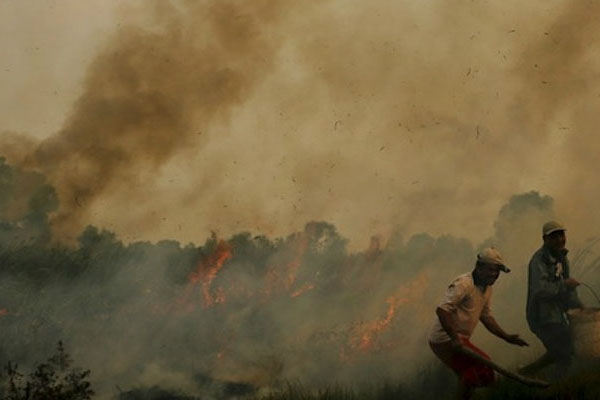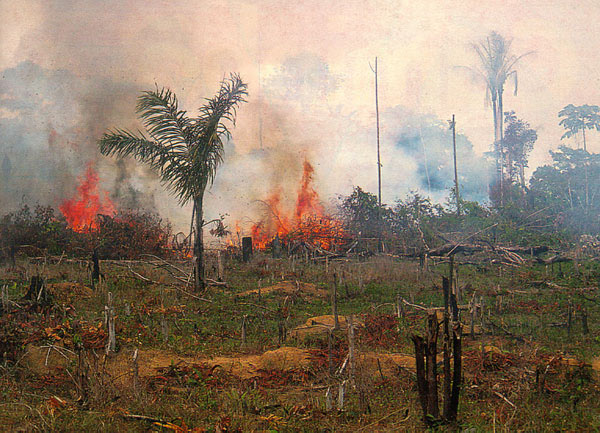
Sustainable Palm Oil – Really??? Is that possible?
“Oxymoron” has always been one of our favorite words. Why? Because usually an oxymoron is funny. It’s a combination of two words which completely negate each other, yet they go together for some reason. For example, when a restaurant menu features “Giant Shrimp”, it always makes us chuckle. “Sustainable palm oil” is another oxymoron that is seeing increased popularity these days.
While oxymorons are often funny, “sustainable palm oil” is not funny at all. While doing research on rainforests, the term “Sustainable Palm Oil” occurs frequently. It seems there is a palm oil industry program that is certifying palm oil production which has not destroyed new rainforests, nor exploited the indigenous inhabitants of lands when for new plantations are created.
Demand for palm oil adds to environmental crisis
If you have been following the news you have surely read about the environmental crisis out of control in Indonesia, as peat bogs and forests are being destroyed to make way for palm oil plantations. On top of the devastating impact of the severe air pollution caused by burning huge tracts of rainforest. In the process there is enormous destruction of orchid habitats. Entire ecosystems are being disrupted at an accelerating rate and being replaced by a monoculture.

Why is “Sustainable Palm Oil” not really possible?
RSPO (Roundtable on Sustainable Palm Oil) is the term used by the palm oil industry to certify their products as “sustainable”. On the surface, this is a good program and one we should support. Unfortunately, there is nothing “sustainable” in a system built on the principle of continuous growth. As corporations continue to manufacture more and more food products and personal care products which contain palm oil, the demand for this commodity continues to increase. The World Wildlife Fund reports expects the volume of palm oil production to increase by more than 65% by the year 2020.
Whenever corporate manufacturers come up with new products such as a new snack food or body lotion they consume additional raw materials which in many cases includes palm oil or a derivative of palm oil. The oxymoron here is not what is said outright but what is implied: “sustainable growth”. Sustainable growth is a complete impossibility when you consider that our planet’s resources are finite, and they are rapidly being exhausted.
The more we learn about palm oil, the more convinced we become that the industry is protecting itself. By making the claim of “sustainable “ but not talking about where the “growth” comes from, it is essentially fooling the public into thinking that palm oil products do no real harm to ecosystems, and that there is essentially no real loss of rainforests. An RSPO certification sounds good in theory, but there is nothing in this RSPO program that will actually curb deforestation. It serves only to inoculate suppliers from criticism.
To believe, or not to believe?
The stated goal of RSPO is to certify that palm oil plantations are situated only in rainforest areas which were previously destroyed, and that no new existing forests are being lost in the process. In reality, this claim is more advertising than fact. No actual controls or moratoriums are in place to ensure compliance. Most shocking of all is the fact that the carbon-rich peat bogs are exempted under this certification. Perhaps they do not qualify as “forests”. But the release of the trapped CO2 and the methane from decomposition after draining are in of themselves contributing 10% of the greenhouse gases impacting our planet
Equally as disturbing, palm oil producers are not able to completely verify that all of their suppliers are protective of new forests. And end users further down the chain (product manufacturers such as, say, Pepsico) certainly cannot make a claim of sustainability, since they have no control of the process. They simply have to take the supplier’s word for it.
If you read product labels and you see a product marked “Green Palm” you might assume that no forests were destroyed. But you would be wrong. “Green Palm” is the palm oil industry logo, owned and issued by the industry. It is not a designation awarded a company for ethical behavior. Rather, it is a certificate palm oil manufacturers can buy to indicate good intentions, but in practice it may only account for a portion of their raw material supplier base.
Advertising and product labels can be deceiving

In an article by the World Wildlife Federation called “Creating Ripples of Positive Change” (with the sub heading “a more sustainable palm oil industry”) the WWF highlights the effort of Johnson and Johnson in palm oil sustainability, projecting 100% compliance by 2015. (You can read it on our web site — OrchidArtByCharlesHess.com; look under “Conservation”). This is just one example where two first class organizations are painting a picture of progress. If you read the article quickly you may feel encouraged. But upon closer examination, you will see that it is more of a show of support and not a real plan that significantly reduces deforestation.
Even the numbers from the palm oil industry itself show an unaggressive plan. The RSPO has certified 10% of the market in 2014 and hopes to reach 25% of the industry by 2015 and 40% by 2020. The forests can’t wait that long. And as we all know, “Hope is not a plan”.
The last two paragraphs of the above 2014 article by the WWF gives us a peek at where the real solution might dwell:
.. even the world’s biggest brands are impacted by the voices of their loyal customers. David McLaughlin, WWF’s vice president of agriculture, reminds us to voice our concerns about the sustainability of companies’ operations to motivate changes like those undertaken by Johnson & Johnson.
As a consumer, your voice has an impact on companies, which can ripple through companies’ supply chains,” he said. “Together we can encourage industries, like the palm oil sector, to embrace a more sustainable future by voting with our wallets.
We can vote with our dollars
Our wallets are our most effective voice. We vote at the grocery store, and we vote at the drugstore. Indeed, when we vote with our dollars, it is our only means of making ourselves heard by large corporations. Anything that affects their bottom line will have their immediate attention. Friends tell us that they have started checking labels on foods and personal products, and choosing those which have no palm oil or only a small amount. With enough people taking this action, change will occur. We have to reduce the demand and not accept a 65% increase in a world market.
Information about products which use palm oil is readily available on the internet. This checklist will help get you started.
Consumer action is effective — we can choose better products

Is it really worth it?
Working together, we can put pressure on the manufacturers to reformulate their existing products to remove palm oil and its derivatives (numbering around 250). None of our research has turned up a single article showing highlighting a company making an effort to remove palm oil from their products, or to discontinue a product line with a high palm oil content. They will do it only if we persuade them by voting with our dollars. In the meantime, the already small remaining habitats in Indonesia will be gone. The industry will then turn to other prime forests, such as the Amazon, and the destruction will continue.
Of course, the palm oil industry firmly states they are against any kind of boycott of products not marked with their RSPO logo. But that is exactly what is needed to get the demand reduced.
Taking steps in the right direction
The Rainforest Action Network has taken some daring and courageous steps to stop the destruction. Much like the “kayaktivists” blocking the Shell Oil Artic exploration, RAN targeted Pepsico with signs posted on vending machines showing a tree stump with the words Pepsico is OUT OF ORDER. Of course an actual boycott would have a greater impact on Pepsico’s bottom line, but it is an effective way to wake up the public, much as the Kayaktivist did for Arctic drilling.
Companies do get these messages. With enough people working together, change will happen.
Your dollar vote does count. Vote for saving the rainforests and our orchids!
![]()